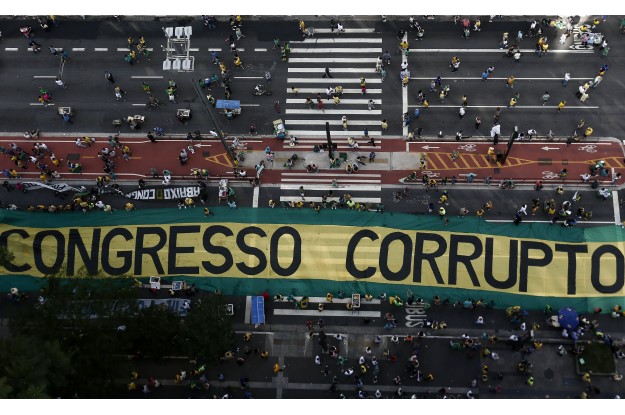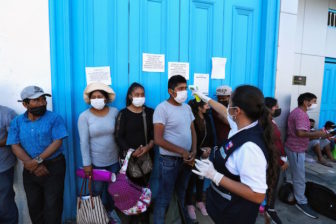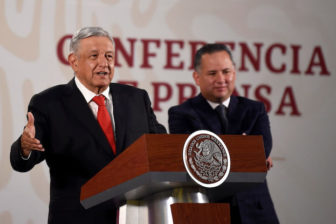This article is adapted from AQ’s latest issue on Latin America’s anti-corruption movement. | Leer en español | Ler em português
“For every thousand hacking at the leaves of evil, there is one striking at the root.”
—Henry David Thoreau
Over the past five years, investigations in Latin America have shed light on shocking, high-level and widespread corruption. Of the investigations that have allowed us to better understand the inner workings of corrupt systems in the region, Lava Jato is the most prominent example: it revealed how a group of Brazilian corporations (with offices and business throughout Latin America) created schemes for illegal campaign financing, bribery, influence peddling and money laundering. These activities had become entrenched in businesses and public institutions, shaping the way economic and political power interact in Latin America today.
Civil society advocates and leaders in both the public and private sectors have taken important steps to push back against this phenomenon. They’ve enacted and implemented laws to crack down on money laundering, regulate access to information, encourage fiscal responsibility and more. In countries like Brazil, Chile, Mexico, Argentina, Colombia and Peru, these steps allowed Lava Jato and similar corruption investigations to take place. Laws enacted in the early 2000s, together with measures that improved federal investigators’ and prosecutors’ autonomy and technical conditions, expanded institutions’ capacity to investigate and prosecute corruption cases. To varying degrees, the advances of the past two decades had a significant spillover effect throughout the region.
However, increased levels of accountability for perpetrators of corruption, in the form of investigations and prosecutions, will not necessarily lead the region towards more democratic, ethical and responsible practices.
Punitive anti-corruption efforts are grounded in the belief that corruption is a disease that affects the functional system of the state; therefore, it is necessary to find remedies for this systemic dysfunction —to trim the dead leaves and hack the sick branches. However, in most Latin American countries, corruption is not a disease that affects healthy institutions: it is part of the normal functioning of the state. It is the root. It is what Latin American states were set up for, building on a history of domination, colonialism and inequality.
The relationship between the political and productive elites explains the role of the state in allowing corruption to flourish. As pointed out by Argentine sociologist José Luis Romero, if one were to investigate the great capitalists in Latin American countries, and if one were to inquire about the origins of their fortunes and the opportunities they’ve been given to build them, it would be evident that what they have in common is their closeness to political power. Brazilian sociologist and jurist Raymundo Faoro expounded the idea that patrimonialism is not a dysfunction of the state, but rather its raison d’être, the main objective of which is to permit powerful private actors who are not able to thrive autonomously to appropriate public benefits. According to Faoro, in his book Os Donos do Poder, patrimonialism is a political-social structure that “withstood all fundamental transformations, the deepest challenges, the crossing of the broad ocean.” Patrimonialism persists in Latin America and every analysis of corruption that does not consider the deep, historical, resilient ties between private entities and public institutions in the region will be merely incremental.
It is important to remember that, in the process of state capture, patrimonialistic practices may influence even those charged with combating corruption. We have seen examples of that in the Lava Jato probe: former Peruvian Attorney General Pedro Chávarry resigned due to accusations that he was obstructing investigations in favor of the leader of the Peruvian Congress Keiko Fujimori. In Colombia, former Attorney General Néstor Humberto Martínez allegedly had links to a bribery case when he was an attorney for Corficolombiana, a minor partner of Odebrecht, before becoming a justice official. More recently, in Brazil, investigative journalists from The Intercept have revealed strong indications that former Judge Sérgio Moro interfered in Lava Jato investigations, exploiting his relationship with prosecutors by providing them with strategic advice, anticipated decisions and sources for the case. These unethical and potentially illegal interventions indicate the risks of politicizing judicial processes, with consequences yet to unfold in Brazil and in the region.
In general, while punitive approaches may increase accountability for corruption crimes, they will not be enough to overcome the spread and the depth of corruption in Latin America. Anti-corruption advocates and reformers need to find ways to channel the public outcry generated by corruption cases into support for structural political reforms. Otherwise, the change represented by corruption revelations will be temporary and selective. Advocates need to connect their agendas to other meaningful struggles in the region: fighting social inequality, defending human rights and strengthening democratic practice, among others. Moreover, it is necessary to account for the fact that anti-corruption work comes with unintended consequences. These may include political misuses of the justice system, reduced levels of trust in democracy and increased support for authoritarian solutions. More than ever, the fight against corruption in Latin America needs to go hand in hand with —and become inseparable from— the battle for democracy in the region.
—
Da Silva is a program officer for the Latin America Program at Open Society Foundations. Abramovay is the Director for Latin America and the Caribbean at Open Society Foundations.








